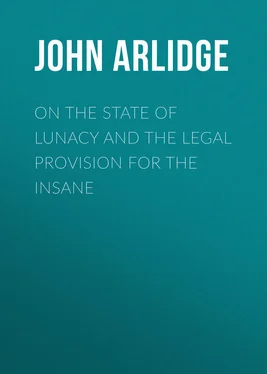John Arlidge - On the State of Lunacy and the Legal Provision for the Insane
Здесь есть возможность читать онлайн «John Arlidge - On the State of Lunacy and the Legal Provision for the Insane» — ознакомительный отрывок электронной книги совершенно бесплатно, а после прочтения отрывка купить полную версию. В некоторых случаях можно слушать аудио, скачать через торрент в формате fb2 и присутствует краткое содержание. ISBN: , Жанр: foreign_antique, foreign_prose, на английском языке. Описание произведения, (предисловие) а так же отзывы посетителей доступны на портале библиотеки ЛибКат.
- Название:On the State of Lunacy and the Legal Provision for the Insane
- Автор:
- Жанр:
- Год:неизвестен
- ISBN:http://www.gutenberg.org/ebooks/44320
- Рейтинг книги:3 / 5. Голосов: 1
-
Избранное:Добавить в избранное
- Отзывы:
-
Ваша оценка:
- 60
- 1
- 2
- 3
- 4
- 5
On the State of Lunacy and the Legal Provision for the Insane: краткое содержание, описание и аннотация
Предлагаем к чтению аннотацию, описание, краткое содержание или предисловие (зависит от того, что написал сам автор книги «On the State of Lunacy and the Legal Provision for the Insane»). Если вы не нашли необходимую информацию о книге — напишите в комментариях, мы постараемся отыскать её.
On the State of Lunacy and the Legal Provision for the Insane — читать онлайн ознакомительный отрывок
Ниже представлен текст книги, разбитый по страницам. Система сохранения места последней прочитанной страницы, позволяет с удобством читать онлайн бесплатно книгу «On the State of Lunacy and the Legal Provision for the Insane», без необходимости каждый раз заново искать на чём Вы остановились. Поставьте закладку, и сможете в любой момент перейти на страницу, на которой закончили чтение.
Интервал:
Закладка:
The value of the conclusion, and of the facts whereon it rests, certainly merit careful examination; and after the investigation made as to the number of the insane, and their rate of increase and accumulation, such an examination can be more readily accomplished.
To revert to the figures put forward by the Commissioners, of the number of beds existing in asylums on the 1st of January, 1858, and of that to be furnished by 1860. They reckoned on 16,231 beds at the former date, and on the addition of 4817 by the year 1860, or a total of 21,048. We have, however, shown, that in January 1858 there were 1300 vacant beds, and that there was an over-estimate of the future increase by about 300, leaving, without reckoning the number in progress, 1000 to meet coming claims. This sum being therefore added, gives a total of 22,048 to supply the wants of the pauper insane between the 1st of January, 1858, and the completion of the new asylums in 1860. Using the average increase adopted by the Commissioners, viz. 915 per annum, there would be at the commencement of the year 1860, 1830 applicants for admission, to be added to the 2467 confined in Licensed Houses, whom the Lunacy Commissioners are so anxious to transfer to county institutions, making in all 4297. But according to our corrected valuation, there would be in the course of 1860, room for 5817 patients, that is, a surplus accommodation for 1520.
It must be admitted as incorrect on the part of the Commissioners, in the Report just quoted, to calculate on the whole number of beds obtained by new buildings, as available in January 1860, when, in all probability, 1000 of them will not be ready much before the close of the year; still, after making allowance for the increased number of claimants accruing between that date and the opening of the new asylums, there would, according to the data used, remain vacancies for some thousand or more, instead of the 520 reckoned upon by the Commissioners.
Our review, therefore, is thus far favourable, and suggestive of the possibility of a breathing time before the necessity of a scheme of a “far more comprehensive nature” need be adopted. But, alas! the inquiries previously gone into concerning the number and increase of the insane render any such hope fallacious, and prove that the Commissioners have very much underestimated the number to be duly lodged and cared for in asylums; unless indeed, after having secured the transfer of those now in Licensed Houses to County Asylums, they should consider their exertions on behalf of the unfortunate victims of mental disorder among the poor brought to a close. Such an idea, however, is, we are persuaded, not entertained by those gentlemen, who have, on the contrary, in their Reports frequently advocated the provision of asylums for all the pauper insane with few exceptions, and distinctly set forth the objections to their detention in workhouses.
In fact, every well-wisher for the lunatic poor, is desirous to see workhouses disused as receptacles for them, and it naturally appears more important to transfer some of their inmates to proper asylums than to dislodge those detained in Licensed Houses, where, most certainly, the means of treatment and management available are superior to those existing in workhouse wards.
But our efforts on behalf of the insane poor must not cease even when those in workhouses are better cared for, since there then remains that multitude of poor mentally disordered patients scattered among the cottagers of the country, indifferently lodged, and not improbably, indifferently treated, sustained on a mere pittance unwillingly doled out by Poor-Law Guardians, and under no effectual supervision, either by the parish medical officers or by the members of the Lunacy Board. Some provision surely is necessary for this class of the insane; some effectual watching over their welfare desirable; for the quarterly visits required by law (16 & 17 Vict. cap. 97, sect. 66) to be made to them by the overworked and underpaid Union Medical Officers cannot be deemed a sufficient supervision of their wants and treatment. These visits, for which the noble honorarium of 2 s. 6 d. is to be paid, whatever the distance the medical officer may have to travel, – are intended by the clause of the Act to qualify the visitor to certify “whether such lunatics are or are not properly taken care of, and may or may not properly remain out of an asylum;” but practically nothing further is attained by them than a certificate that the pauper lunatic still exists as a burden upon the parish funds; and even this much, as the Commissioners in Lunacy testify, is not regularly and satisfactorily obtained. A proper inquiry into the condition of the patient, the circumstances surrounding him, the mode of management adopted, and into the means in use to employ or to amuse him, cannot be expected from a parish medical officer at the remuneration offered, engaged as he is in arduous duties; and, more frequently than not, little acquainted with the features of mental disease, or with the plans for its treatment, alleviation, or management.
Even in the village of Gheel in Belgium, which has for centuries served as a receptacle for the insane, where there is a well-established system of supervision by a physician and assistants, and where the villagers are trained in their management, those visitors who have more closely looked into its organization and working, have remarked numerous shortcomings and irregularities. But compared with the plan of distributing poor demented patients and idiots, as pursued in this country, in the homes of our poorer classes and peasantry, unused to deal with them, too often regarding them as the subjects of force rather than of persuasion and kindness, and under merely nominal medical oversight four times a year, Gheel is literally “a paradise of fools.” Indeed a similar plan might with great advantage be adopted, particularly in the immediate vicinity of our large County Asylums.
But to return to the particular subject in question, viz. the proportion of insane poor in workhouses and elsewhere who should rightly find accommodation in asylums, a class of lunatics, as said before, not taken into account by the Commissioners in their estimate of future requirements.
We let pass the inquiry, what should be done for the 8000 poor imbecile and idiotic paupers boarded in the homes of relatives or others, and confine our observations to the 7947 inmates of workhouses. Now, although we entertain a strong conviction of the evils of workhouses as receptacles for the insane, with very few exceptions, – a conviction we shall presently show good grounds for, yet, instead of employing our own estimate, we shall endeavour to arrive at that formed by the Lunacy Commissioners, of the proportion of lunatics living in them, for whom asylum accommodation should be provided.
The principal and special Report on Workhouses, in relation to their insane inmates, was published in 1847, and in it the Commissioners observe (p. 274), that they believe they “are warranted in stating, as the result of their experience, that of the entire number of lunatics in workhouses, – two-thirds at the least – are persons in whom, as the mental unsoundness or deficiency is a congenital defect, the malady is not susceptible of cure, in the proper sense of the expression, and whose removal to a curative Lunatic Asylum, except as a means of relieving the workhouse from dangerous or offensive inmates, can be attended with little or no benefit. A considerable portion of this numerous class, not less perhaps than a fourth of the whole, are subject to gusts of passion and violence, or are addicted to disgusting propensities, which render them unfit to remain in the workhouse… But although persons of this description are seldom fit objects for a curative asylum, they are in general capable of being greatly improved, both intellectually and morally, by a judicious system of training and instruction; their dormant or imperfect faculties may be stimulated and developed; they may be gradually weaned from their disgusting propensities; habits of decency, subordination, and self-command may be inculcated, and their whole character as social beings may be essentially ameliorated.”
Читать дальшеИнтервал:
Закладка:
Похожие книги на «On the State of Lunacy and the Legal Provision for the Insane»
Представляем Вашему вниманию похожие книги на «On the State of Lunacy and the Legal Provision for the Insane» списком для выбора. Мы отобрали схожую по названию и смыслу литературу в надежде предоставить читателям больше вариантов отыскать новые, интересные, ещё непрочитанные произведения.
Обсуждение, отзывы о книге «On the State of Lunacy and the Legal Provision for the Insane» и просто собственные мнения читателей. Оставьте ваши комментарии, напишите, что Вы думаете о произведении, его смысле или главных героях. Укажите что конкретно понравилось, а что нет, и почему Вы так считаете.












